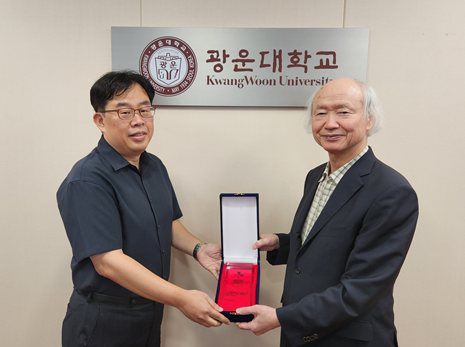Professor Jae-ho Shin wins Award at the 2024 MEDITEK Innovation Awards
- admin
- 2024-10-04
- 162
Professor Jae-ho Shin (Department of Chemistry)
Wins 'BEST' Technology Award at the 2024
MEDITEK Innovation Awards
- Highly sensitive, label-free
immuno-biosensor technology using electrochemically active nanoparticles -
Professor Jae-ho Shin from the
Department of Chemistry has been recognized with the 'BEST' Technology award at
the 2024 Meditech Innovation Awards (MEDITEK Innovation Awards).

Professor Jae-ho Shin receiving the award from President Jangho Chun
(Photo: Kwangwoon University Industry-Academic Collaboration Foundation)
The 2024 MEDITEK event is hosted by the MEDITEK
Organizing Committee and co-organized by the Korea Association of University
Technology Transfer Management, Korea Association of Technology Holdings, Korea
Association of Research Institute Technology Transfer, Daegu-Gyeongbuk Medical
Innovation Foundation, Osong Medical Innovation Foundation, Korea Innovation
Foundation, and National Research Foundation of Korea. Held for the second consecutive year, the event attracted
a large number of startups and universities with innovative technologies.
The MEDITEK Awards evaluate the
technicality, product potential, and innovation of medical devices and
healthcare-related technologies submitted by universities, hospitals, research
institutions, startups, and SMEs. Of the 42 technologies recognized as
'Excellent,' 10 were selected as 'BEST.'
Professor Shin's technology,
based on an aptamer-based, label-free rapid and accurate measurement technique,
eliminates the need for a secondary aptamer, which is required in conventional
sandwich-type immuno-biosensors. The high reliability and technical innovation
of this sensor earned him the 'BEST' Technology award in the 'Diagnostics and
Laboratory Equipment' category.
Professor Shin remarked, "This award-winning
technology offers an original sensing platform that simplifies the measurement
process while implementing a highly sensitive sensor. As a first-of-its-kind
technology in the industry, it is expected to be applied across various
immuno-biosensors detecting protein-based biomarkers (such as cancer,
cardiovascular diseases, infectious diseases, and glycated hemoglobin),
demonstrating its versatile potential."
https://www.kw.ac.kr/ko/life/newsletter.jsp?BoardMode=view&DUID=47656?